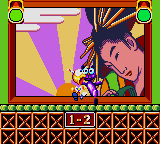Retro Replay Review
Gameplay
Dynamite Headdy stands out in the crowded platformer genre by placing its main weapon—the hero’s own head—firmly in the player’s control. Rather than collecting one-off power-ups in the traditional sense, you pick up different heads throughout each level that grant unique abilities, from healing effects to wall-sticking claws. Swapping heads on the fly is intuitive: a quick button press brings up the head menu, and you can cycle through your arsenal in real time, adapting to hazards and enemies with satisfying fluidity.
(HEY YOU!! We hope you enjoy! We try not to run ads. So basically, this is a very expensive hobby running this site. Please consider joining us for updates, forums, and more. Network w/ us to make some cash or friends while retro gaming, and you can win some free retro games for posting. Okay, carry on 👍)
The core platforming is deceptively simple, but the depth of the head-swapping mechanic elevates every stage. Early levels teach you how to use a propeller head to hover over bottomless pits and a bird head to glide across wide chasms, while later stages introduce jet heads that let you blast through wave after wave of foes in traditional side-scrolling shooter segments. The constant shift between run-and-jump, head-based traversal, and shoot ’em up action keeps the pacing brisk—just when you think you’ve mastered one dynamic, the game challenges you with another.
Controls are tight and responsive, as you’d expect from a Sega Genesis/Mega Drive title from Treasure. Headdy moves and jumps with precision, and the head-firing mechanic feels weighty yet controllable. Boss fights leverage all of your head options, demanding tactical swaps mid-battle. The difficulty curve is well judged: early stages serve as a sandbox for learning new heads, while later levels punish hesitation with cleverly placed hazards and relentless enemy patterns.
Graphics
Visually, Dynamite Headdy is a feast of bold colors and playful character designs. The sprite work is polished, with Headdy himself animated in a range of lively poses—running, throwing, and even riding flying objects. Environmental detail is high, from the crumbling ruins of Puppet Land to the eerie machinery of Dark Demon’s fortress. Background layers parallax smoothly, creating a sense of depth rare for a 16-bit game.
Each head you collect has its own distinct look, making it immediately clear which ability you’re wielding. The visual feedback when your head attaches to a wall or spins like a helicopter blade is gratifying, and enemy animations react believably to each head’s effects. Whether you’re using a cannon head to blow a foe apart or a sticky head to cling to ceilings, the graphical flourishes reinforce the gameplay mechanics in an aesthetically pleasing way.
The game’s palette ranges from bright carnival hues to ominous industrial greys, and the transitions between worlds feel cohesive rather than jarring. Special effects—explosions, flashing lights, and spark trails—are crisp and colorful, helping the action pop even when the screen gets busy. Overall, Dynamite Headdy pushes the Genesis hardware to its limits without sacrificing clarity or readability.
Story
At its core, Dynamite Headdy tells a lighthearted but engaging tale of a puppet king gone mad. Dark Demon, the diabolical ruler of Puppet Land, has brainwashed all of Headdy’s subjects, turning them into hostile minions. In a classic “save your homeland” trope, Headdy must reclaim his people’s heads—both figuratively and literally—as he battles through Dream Forests, Toxic Sewers, and the cloud-bound Spook-Boos’ realm.
Rather than grind through dry expository text, the game uses brief cutscenes and humor-filled boss introductions to propel the narrative. Puppet characters crack jokes, express fear, or jeer at Headdy as you approach, lending personality to otherwise straightforward platforming stages. The story never overshadows the gameplay; instead, it provides a charming framework that motivates you to push forward and liberate each zone.
While the plot is far from heavyweight drama, it maintains a consistent tone of whimsy and adventure. Treasure’s knack for quirky character design shines through in every dialogue box, and the occasional mid-level gag—like a giant floating eyeball that laughs when you miss a jump—reminds you that Puppet Land is as absurd as it is dangerous. For many players, that balance of humor and heroism is a major draw.
Overall Experience
Dynamite Headdy remains a shining example of creative platforming from the 16-bit era. Its head-swap mechanic never feels gimmicky; instead, it delivers varied gameplay moments that segue seamlessly between running, jumping, shooting, and puzzle-solving. The level design encourages exploration, with hidden areas that require clever use of specific heads to unlock secret capsules filled with extra lives or bosses masquerading as power-ups.
Replay value is strong thanks to the game’s branching paths, hidden collectibles, and challenge modes that test your mastery of head abilities. Players seeking a true test can hunt for all 20 hidden treasure chests, each guarded by a tougher-than-average mini-boss. Speedrunners also appreciate the tight controls and sequence-breaking potential that arises from advanced head techniques.
For retro enthusiasts and newcomers alike, Dynamite Headdy offers a polished, playful, and endearing platforming experience. Its blend of inventive mechanics, eye-catching graphics, and lighthearted story makes it a standout title that still feels fresh decades after its original release. Anyone looking for a platformer with personality and punch should have Headdy at the top of their wishlist.
 Retro Replay Retro Replay gaming reviews, news, emulation, geek stuff and more!
Retro Replay Retro Replay gaming reviews, news, emulation, geek stuff and more!








Reviews
There are no reviews yet.